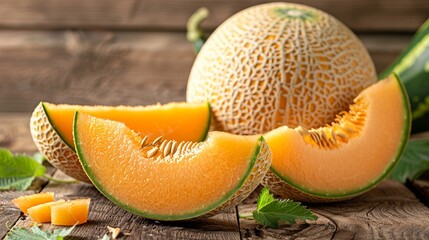
Muskmelon, a sweet and refreshing fruit, has been a staple in summer gardens and farms for centuries. However, growing muskmelon successfully requires more than just planting seeds and waiting for the harvest. Pests and diseases can wreak havoc on your crop, reducing yields and impacting fruit quality. Selecting the right muskmelon seed varieties protects your crops from common threats like fusarium wilt, powdery mildew, and insect infestations.
This guide will delve into the importance of choosing disease-resistant muskmelon seed varieties and how they can help reduce pest issues. Understanding the balance between seed selection, pest management strategies, and proper care will protect your crops and boost your farm’s productivity.
Why Seed Selection is Key to Pest and Disease Control
When it comes to farming, prevention is always better than cure. The first line of defense against pests and diseases is choosing muskmelon seed varieties explicitly bred for resistance. Modern breeding techniques have allowed for the development of seeds that can withstand various environmental stresses, including fungal infections and pest attacks. By planting these varieties, you can drastically reduce the need for chemical treatments and improve the overall health of your muskmelon crops. Disease-re
resistant varieties help lower the incidence of common pathogens and ensure plants can survive environmental challenges like humidity, drought, or extreme temperatures. These varieties can be precious in organic farming, where pesticide use is limited. When you buy muskmelon seeds, select varieties known for their resilience in the face of pests and diseases.
Top Disease-Resistant Muskmelon Seed Varieties
1. Fusarium Wilt-Resistant Varieties
Fusarium wilt is one of the most damaging diseases affecting muskmelon crops. It is caused by the soil-borne fungus Fusarium oxysporum and can lead to stunted growth, wilting, and plant death. This disease is particularly challenging because it can remain in the soil for years once it infects it.
Several fusarium-resistant muskmelon varieties have been developed to combat this issue. For example:
- Superstar F1: This hybrid variety is resistant to fusarium wilt and produces enormous, sweet melons with an extended shelf life.
- Ambrosia: Known for its fragrant aroma and excellent disease resistance, Ambrosia is ideal for organic farmers looking for a variety that can withstand common soil-borne diseases.
Planting fusarium-resistant varieties can significantly reduce the risk of crop loss and ensure a healthier, more productive harvest.
2. Powdery Mildew-Resistant Varieties
Powdery mildew is another widespread disease that can seriously affect muskmelon crops, especially in humid conditions. This fungal disease manifests as white, powdery spots on leaves, which can ultimately reduce the plant’s ability to photosynthesize and cause fruit distortion.
To combat powdery mildew, growers should opt for resistant varieties. Some top picks include:
- Hale’s Best Jumbo: Besides being a high-yield variety, this muskmelon is naturally resistant to powdery mildew, making it ideal for regions with high humidity.
- Arava F1: This Galia-type melon variety is known for its robust resistance to powdery mildew and fusarium wilt. It produces sweet, tropical-flavored melons that are popular in markets worldwide.
3. Downy Mildew-Resistant Varieties
Unlike powdery mildew, downy mildew thrives in more relaxed, wet conditions. This fungal disease affects muskmelon leaves, creating yellow and brown spots that hinder the plant’s ability to grow. Downy mildew can spread quickly, especially during rainy seasons, leading to severe yield reductions if not correctly managed.
Fortunately, seed breeders have developed more tolerant varieties to this disease. One example is:
- Honey Rock: This heirloom variety is cherished for its sweet flavor and is also resistant to downy mildew, making it a solid choice for farmers who experience unpredictable weather conditions.
“Farming is a profession of hope.” – Brian Brett
Pest Management: How Disease-Resistant Varieties Help
While disease-resistant varieties primarily protect against fungal infections, they can also indirectly manage pest populations. Healthy, vigorous plants are better equipped to withstand pest attacks and recover from damage. Additionally, plants not weakened by diseases are less attractive to many insects, which often target compromised plants.
However, planting disease-resistant seeds should be just one part of your overall pest management strategy. Here are a few additional methods you can implement to protect your muskmelon crops:
- Companion Planting: Certain plants, such as marigolds, basil, or nasturtiums, can help repel pests like aphids and squash bugs.
- Biological Controls: Introducing beneficial insects like ladybugs and predatory wasps can help keep pest populations in check.
- Mulching and Crop Rotation: Mulching helps retain soil moisture and suppresses weeds, which can harbor pests. Crop rotation prevents the buildup of pests and diseases in the soil.
Combining these strategies alongside disease-resistant muskmelon seed varieties can lead to a healthier crop with fewer pest problems.
Balancing Organic Farming and Pest Control
Finding a balance between pest control and sustainability is often challenging for farmers committed to organic farming. Fortunately, developing disease-resistant seed varieties has made it easier to grow muskmelons organically without relying on chemical pesticides.
Planting resistant varieties can significantly reduce the interventions needed to manage your crops. This is especially important in organic farming, where synthetic chemicals are restricted. Along with crop rotation, companion planting, and biological controls, resistant muskmelon seeds allow you to maintain a healthy crop without compromising your commitment to sustainable agriculture.
Organic farming statistics show that adopting resistant seed varieties can reduce the need for chemical inputs by up to 40%, making it a vital part of any sustainable pest management plan. Not only does this benefit the environment, but it also enhances the quality of your produce, meeting the growing consumer demand for organic and chemical-free fruits.
Moving Forward with Disease-Resistant Muskmelon Seeds
While disease-resistant varieties offer an excellent starting point for protecting your muskmelon crops, they are not a one-size-fits-all solution. Every growing season is unique, and prosperous farmers continually adapt their strategies based on current conditions and new technologies.
As you look forward to future planting seasons, consider trialing new seed varieties that offer improved resistance or better adaptability to your farm’s climate. Integrating other sustainable farming practices, such as enhanced soil management and biological pest control, can ensure long-term success.
Each season brings new lessons. By staying informed about emerging muskmelon seed varieties and adjusting your pest management techniques, you can build a more resilient, productive farm that thrives no matter what challenges arise.
people read also : Top Choice as Fennel Seeds Exporters in India











